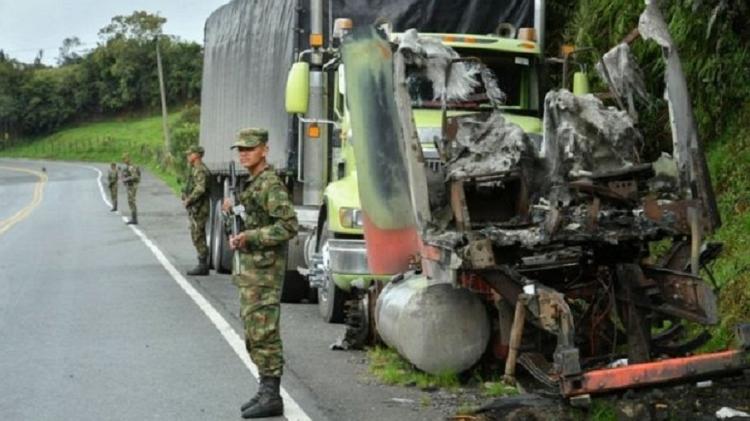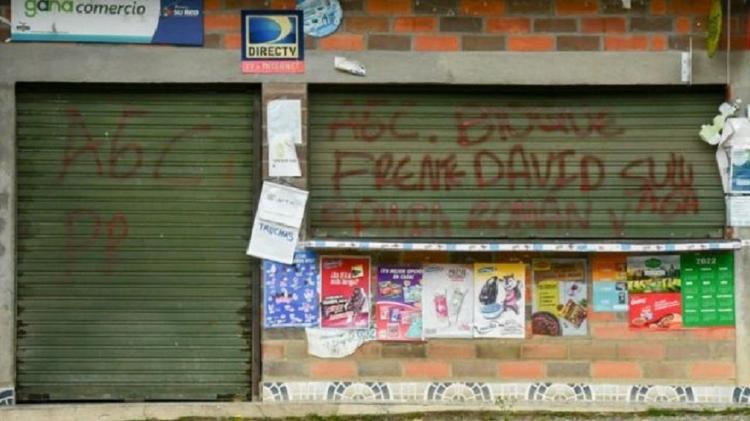The extradition of Dairo Antonio Úsuga, known as “Otoniel”, Colombia’s most wanted man, triggered an immediate response from the criminal organization Clan del Golfo, which he commands.
On May 5, the Gulf Clan, also known as Autodefensa Gaitanista de Colombia (AGC), published a leaflet declaring a “4-day armed strike”.
It was stated in the brochure that “opening any kind of business” and “moving by any means of transportation” are prohibited.
The proclamation put an end to the threat of “adverse consequences” for those who did not comply with these measures.
According to Gulf Clan, the curfew was scheduled to end at midnight last Monday (09/05).
The stay was enforced after Otoniel was extradited to the United States last Wednesday, where he will face trial in local court.
Otoniel is accused of being the author of massacres, deportations, kidnappings and acts of pedophilia, as well as being a powerful drug dealer and head of the feared Clan del Golfo.
This isn’t the first time Colombia has faced a curfew imposed by an illegal armed group, but analysts say there are new features in this latest action.
Here are some key points to understand the current situation.
1. What is an armed strike?
In Colombia, “armed strikes” refer to actions by illegal groups formed by guerrillas, paramilitaries or drug traffickers to block roads, restrict the movement of people and vehicles, threaten them, in addition to attacks against civilians and the armed forces. the closure of commercial establishments and the suspension of classes at colleges and universities.
In this last act, the Gulf Clan threatened to attack those traveling on the roads of various Divisions (States) in the country, including caravans accompanied by the army.
National Liberation Army (ELN) guerrillas have announced several such actions, most recently last February.
But none of these past outages have affected so many regions at once, according to the EFE news agency.
As the InSight Crime portal explains, “The gun strike has been a common strategy of armed actors in Colombia as a show of force when faced with military operations or in response to the assassination or capture of their bosses on the eve of an election.”
2. How did this new curfew come about?
The Gulf Clan announced the armed attack in retaliation for the extradition of its main leader, Dairo Antonio Úsuga, to the United States.
According to a report by the Colombian National Police and the Foundation for Peace and Reconciliation, the criminal organization led by Otoniel is located in 211 of the country’s 1,103 municipalities.
It is estimated that more than 1,000 men moved under his leadership, most of them former members of the defunct guerrillas of the People’s Liberation Army (EPL) and the United Self-Defense Forces of Colombia (AUC). It ceased operations in 2006.
Otoniel himself was part of the EPL, and when this guerrilla group was demobilized in 1991, he decided to switch sides: he joined the AUC, which occupied the Urabá region in northwest Colombia.
3. What is the effect of the new curfew?
On Monday (09/05), the Special Jurisdiction for Peace (JEP), an organ of Colombian Justice, reported that 11 out of 23 departments in a total of 178 municipalities in the country were affected by acts of violence.
A few deaths have been recorded, although there is disagreement about the figures.
According to the agency, 24 civilians and two members of the security forces died. 26 roads were closed to traffic, 138 communities were closed, and security forces were attacked in 22.
However, the Ministry of Defense reported that six people were killed, including three civilians, a policeman and two soldiers.
180 vehicles were also attacked and most of them burned.
One of the most affected areas is the city of Monteria in the Cordoba Department, where shops, schools and universities have been forced to close.
On Saturday, the local ombudsman reported that 162 patients in Cordoba were unable to receive dialysis treatment.
“These people’s lives are in danger if they do not receive these supplies soon,” warned Ombudsman Carlos Camargo Assis.
Monteria Transport Terminal reported that the number of buses dropped by more than 90% on Saturday.
A national championship football game in the city was also cancelled. The visiting team, Deportivo Medellin, did not go to the match as it “could not guarantee the security of the delegation”.
In the Department of Antioquia, where Medellin, the country’s second largest city, is located, there was a shortage of gas supplies, affecting 77,000 people in several municipalities.
Other departments that appear to be among those most affected by the acts of violence are Sucre, Bolivar, La Guajira, Atlântico and Chocó.
Nidia Hernández, president of the Colombian Federation of Road Cargo Carriers (Colfecar), reported that the curfew caused losses of US$3.2 million (R$16.4 million).
According to the Ministry of Defense, 93 municipalities registered less than 50% business opening last Monday.
4. What makes this curfew different?
When Otoniel was captured in October 2021, Colombian President Iván Duque claimed this coup was the “end of the Gulf Clan”.
But with this curfew, the group showed that it still has the capacity to cause trouble.
According to the La Silla Vacía portal, this pause is the largest for the Gulf Clan in six years.
“The curfew shows that the Gulf Clan has the criminal power to cripple entire departments,” said an analysis by Portal.
Sergio Guzmán, director of Colombia Risk Analysis, a political and security risk consultancy operating in Colombia, sees two more specific factors in this armed shutdown.
“We’ve already seen that when you’re a capo [chefe] He is caught, a ‘gun plan’ is launched: police are killed, police stations are attacked. However, this attack was aimed more broadly at the civilian population,” he said.
“We’ve seen that with the ELN, but not necessarily with the Gaitanistas Self-Defense Forces.”
“It is alarming that an illegal armed group has the capacity and intent to carry out an armed action of this magnitude. This requires a highly developed political and military infrastructure.”
La Silla Vacía journalist Laura Ardila described the curfew as “unprecedented”.
“This outage is unprecedented because this is the first time AGC is coming to areas that have survived violence or have not experienced violence in years,” Ardila told the BBC.
“They have demonstrated capacity for expansion in fear control and enforcement.”
Likewise, Guzmán points out that the strike affected less environmental areas.
“They are dangerously approaching city centres. In an economically important city like Monteria, it’s important to have business shut down. It’s a city well-connected to national infrastructure.”
5. How the government reacted (and why it was criticized)
On Monday, the Department of Defense released an assessment of the actions of the public force to face the consequences of the armed strike.
The ministry states that “180 members of the Gulf Clan have been captured, neutralized and brought to justice.”
It also reported that it had mobilized 19,729 military personnel and carried out overflights, raids, patrols, police escorts and food delivery.
On Sunday, President Duque offered a reward in the equivalent of US$1.2 million (R$6.1 million) to anyone who provides information leading to the capture of other members of the Gulf Clan.
“To be clear: they will either surrender or end up like Otoniel,” the President warned.
“We will continue to break the entire Gulf Clan chain permanently.”
However, some sectors have voiced their criticism of the government’s response.
“It’s easy to be brave in Casa de Nariño [sede governo colombiano] “The time has come to visit areas where we are suffering, we are starving and there is no way to evacuate the wounded and sick,” Frontino (Antioquia) mayor Jorge Hugo Elejalde said on Saturday, with 300 police and bodyguard escorts, in statements by EFE.
Aníbal Gaviria, the governor of Antioquia, said in an interview with W Radio on Monday that “the Colombian state’s territorial control for forty or fifty years has been filled with gaps full of shortcomings, and this has given strength to stall.”
La Silla Vacía’s analysis argues that, despite Otoniel’s extradition, Duque’s Colombia “could not guarantee basic security measures such as free movement over large areas of the country”.
Analyst Sergio Guzmán said the government’s response was not timely.
“I see the authorities not responding with all the weight of the law and the expected speed,” the analyst says.
“President Duque’s government split amid the inauguration strike of the Costa Rican president and did not appear in Monteria.”
“I’m not even talking about the military forces that were only mobilized on Sunday, with the strike agreed on Thursday. It’s alarming because they don’t seem to be giving the weight it deserves to a movement that has paralyzed, threatened or encircled a large part of the country’s population.”
According to Guzman, the curfew is a sign that the security situation in the country is “eroding” and that the government has lost its monopoly on the use of force.
“The government’s failure to perceive this as a serious threat to the nation’s existence appears to be underestimating the threat it poses,” concludes the analyst.
source: Noticias

